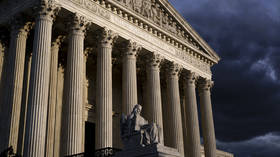Barrett, Kavanaugh lead Supreme Court in denying relief to religious Maine healthcare workers objecting to Covid vaccine mandate

The US Supreme Court has rejected by a vote of 6-3 the motion by Maine healthcare workers to block the state’s Covid-19 vaccination mandate on religious freedom grounds. Justices Alito, Gorsuch, and Thomas were the dissenters.
The majority position was written by Justices Amy Coney Barrett and Brett Kavanaugh – appointed by former President Donald Trump – who argued that the request came to the court on a “shadow docket” and that “discretionary consideration” allowed the court to reject such a case.
BREAKING: By a 6–3 vote, the Supreme Court DENIES a request to block Maine's COVID vaccine mandate for health care workers with religious objections. Gorsuch, Alito, and Thomas dissent. https://t.co/B2bx5jZMFA
— Mark Joseph Stern (@mjs_DC) October 29, 2021
Applicants can use the emergency docket to force the court to decide on cases it would be unlikely to take otherwise, Barrett and Kavanaugh argued in a one-paragraph ruling. Chief Justice John Roberts and Justices Sonia Sotomayor, Elena Kagan, and Stephen Breyer concurred.
Justices Neil Gorsuch (another Trump appointee), Samuel Alito, and Clarence Thomas dissented, arguing in eight pages that “Maine’s rule contains no exemption for those whose sincerely held religious beliefs preclude them from accepting the vaccination,” unlike those of other states.
Maine “does not dispute that its rule burdens the exercise of sincerely held religious beliefs,” the trio wrote, nor does it dispute the claim by the applicants – nine healthcare workers – of “an impermissible connection between the vaccines and the cell lines of aborted fetuses.”
The Gorsuch-penned dissent also argued that “civil liberties face grave risks when governments proclaim indefinite states of emergency.”
Also on rt.com US Supreme Court declines to block Indiana University’s vaccine mandate, preserving key precedent for compulsory Covid-19 jabsBarrett has previously refused another plea for relief on religious freedom grounds, by students and staff of Indiana University, in September – the first legal challenge against Covid-19 vaccine mandates before the Supreme Court. Earlier this month, Sotomayor rejected the plea from New York City teachers against that city’s mandate, without offering an explanation.
The highest US court has been loath to revisit the 1905 decision in Jacobsen vs. Massachusetts, which has stood as precedent for over a century and ruled that states can force citizens to get vaccinated – albeit against smallpox, a far more contagious and lethal virus.
Think your friends would be interested? Share this story!













